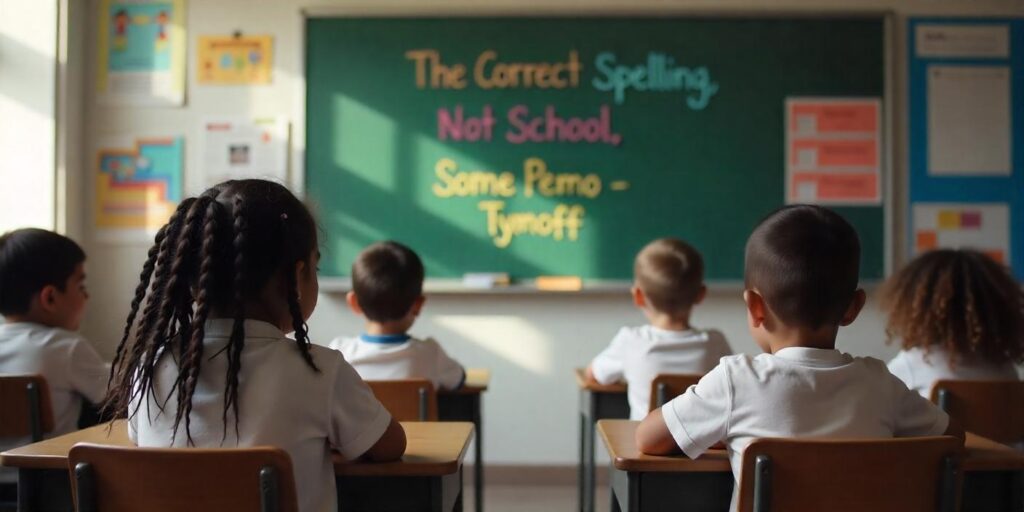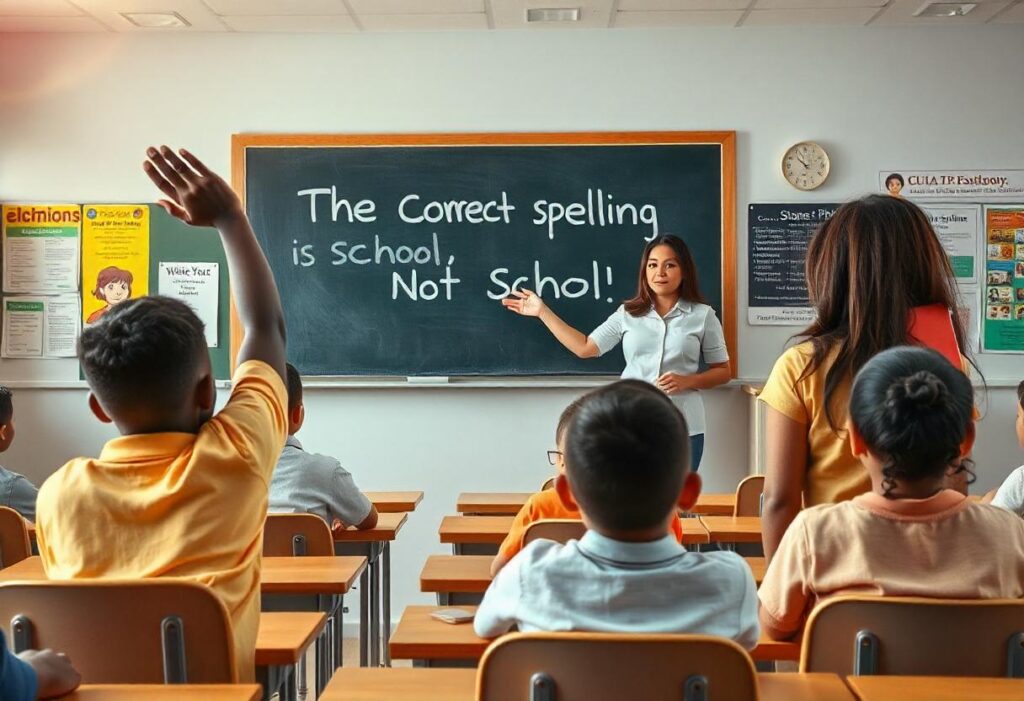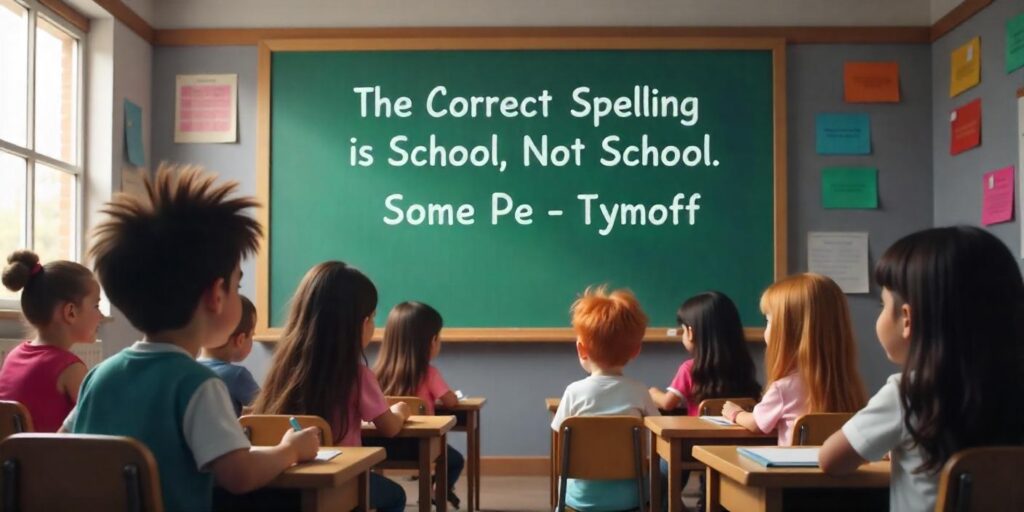What Does the Phrase Mean?
The phrase “the correct spelling is school not school. some pe – tymoff” looks a little confusing at first sight. It is a bit of humor, informal language, and a playful comment on common mistakes people often have regarding spelling. Breaking it down part by part can be helpful for everyone.
A Playful Reminder on Spelling
The word “school” is utilized twice in the first part of the phrase: the correct spelling is school not school. It reads wordy or unnecessary, at face value. Yet that is the beauty of it-therein lies the humor; perhaps it is as simple as the spelling of the word “school.” In such an overstatement, the word can call attention to something as obvious as the spelling of the word “school.”.
This form of redundancy is usually resorted to tongue-in-cheek sense while attempting to indicate how glaringly evident something is. It playfully repeats spelling once again so as to make an attack on the fact that in the first place, nobody may get mistaken about the word “school” with some other word- there isn’t. The nature of good-natured joking we employ upon our friends or family members with respect to some goofy error cannot possibly speak for itself anymore.
The Mystery of “Pe – Tymoff”
The last part of the sentence, “some pe-off,” sounds a bit mysterious and even funny. The “pe” is short for “people,” but not written conventionally. This type of laxity in word usage gives the impression of something funny. In contrast, “off” is not even a word in the English vocabulary, and thus adds an air of absurdity to the statement.
Maybe it is a spelling mistake? Perhaps, but what makes “tymoff” funny is that it is a word that is not found in the dictionary in the standard language. The speaker seems to be indicating that perhaps certain individuals would utter such a peculiar, meaningless word in this case, maybe those who would misspell “school.”. This means that it is as if saying, “Some people just aren’t very good at spelling, and they might even invent words!” Here, the term mocks not only misspelling but also creates nonsense words.
The Humor in the Whole Phrase
So what does “the correct spelling is school, not school. some pe – tymoff mean? It is silly. The repetition of the word “school” makes the sentence sound very formal and tautological as “tymoff” is dumbo in itself. Therefore, it is a joke on people’s expense of misspell-ing simple words but obsessed over something like “correct spelling” of “school”.
A Lighthearted Criticism
In summary, “the right spelling is school not school. Some pe – tymoff” is an informal, almost mocking way of pointing out something that is basically obvious. It’s not meant to be hard-hitting or critical in a serious fashion. Rather, it pokes fun at the ridiculousness of getting something as simple as this wrong. The tone is playful, charming, and meant to be light-hearted rather than offend.
However, there is still a deeper point here: it’s easier to get swept up in language perfectionism; sometimes it makes communication more funny when it laughs at our weaknesses.
Everybody fails and it doesn’t matter which one of those mistakes to look at and poke fun at each other for their mistakes.
Innovation of Communicative Language
Language is not only informal or flexible but most modern in this online age. The Internet-based social networks, text messages, and several websites and chat forums created an almost infinite colloquial expressions, acronyms, and unconscious spellings. For example, one may read in print a saying like “the correct spelling is school not school. some pe – tymoff.” This expression goes all around and plays on modern informality as a game at the expense of the structure found in conventional grammar.

Why It Matters To Know the Context
Knowing where such phrases were used is important. While the right spelling is school not school. some pe-tymoff would be amusing to read in informal, friendly discourse, it is probably to be misplaced or inappropriate in formal writing or scholarship. It all reminds one how language changes from one context and audience to another.
A Last Laugh
In the end, this phrase all boils down to enjoying the idioms of the language and finding humor in the simplest things. “The correct spelling is school not school. Some pe-off” is a beautiful example of how we can employ humor to point out something banal, such as spelling, while also being a little amusing about it.
The next time you hear some clown misspell “school,” you can smile and tell yourself, “The right way is school, not school. some pe- tymoff.” We all have our naughty moments of playful confusion, and so language ought not to just be a gadget for communication, but also an amusement.
The Role of Humor in Learning and Communication
Learning is done by humor, and so is teaching. Funny adds some fun to a dry or serious topic, such as spelling. Some fun adds to it, and it can better stick in the mind. “The correct spelling is school, not school. Some pe-tymoff is a perfect example of how something so simple like spelling becomes less intimidating or boring.”.
This is by lightening something as minor as a spelling mistake; it makes the learning experience more soft. It does not sharply criticize a person for an ordinary mistake, and it brings a sense of humor to everyone’s occasional errors. The tension thus created is dissipated, but in addition, the approach helps a person have a more positive attitude toward making mistakes and learning from them.
For those of us who had trouble with spelling and grammar, these types of lines create a kind of camaraderie. A reminder that none of us are ever perfect, that mistakes are in the process, and we ought to be developing rather than achieving “perfection” while probably laughing a bit along the way!
Language and Identity: How We Use Slang and Informal Phrases
Another interesting topic, about how language represents identity and culture, arises in the phrase “the correct spelling is school, not school. some pe – tymoff”. Generally, in casual settings, slang, non-standard spellings, and creative language forms are often used to express ideas more casually. Whether by text message, social media posting, or conversation, language follows our social and personal needs.
Tymoff,” in this light, is a joke word. It’s not listed in any standard dictionary, but it fits perfectly well into the joke itself; it just says what was needed to create the pun. This kind of linguistic creativity helps show how words grow and develop within the frame of a joke or a character. Such ad-hoc creative use of words enlightens our perceptions about communication with other humans and with our environment.
The end result is therefore the creation of an in-group, so to speak, especially if invented words or even funny phrases are circulated among friends or groups in the social network, leading to a collective sense of events experienced that no amount of strict grammatical or spelling rules would enclose within.
In any case, those very same moments are potent instruments in weaving the in-group bonds.
Balancing Informality and Formality
While “the correct spelling is school not school. some pe – tymoff” is very well suited to informal settings, it raises an interesting question of how much leeway there should be in the use of language. When can one play with language and when must one strictly adhere to the rules?
Precision in language is necessary when used in professional, academic, or official settings because it gives the reader or listener clarity and helps avoid misunderstanding. But for colloquial or social networking, it has much room for humor and flexibility. This also calls for understanding that language is dynamic, and context plays a huge role in how we decide to communicate.
This phrase embodies this tension between formal and informal language. Yet, while there is obviously the playfulness and structure and the tone, simultaneously, it continues on to make a serious claim: spelling correctly “school,” but the joke dissipates any tension that might have had in being awkward about making that mistake.
Effects of Digital Communications on Language Games
The rise of texting, social media, and online forums has increased the use of informal language and playful phrases such as “the correct spelling is school not school. some pe – tymoff”. The new slang, abbreviations, and even misspellings that are used for comedic or creative purposes have resulted from this shift in communication methods.
Online spaces create an environment where users can experiment with language in ways that they might not even do in a face-to-face conversation. There’s the whole thing of using numbers instead of letters, entirely new words created, or purposefully misspelling something just for the humor; these linguistic inventions have become hallmarks of digital culture. And it is all part of the fun, and indeed, the kind of humor expressed in these ways often helps connect us with each other.

Imperfections in Communication
In a world in which perfection rules, “the correct spelling is school not school. Some pe – tymoff” reminds us of imperfections, the journey toward the destination, as everyone has his or her mistakes. Mistakes sometimes bring about the ‘humanity’ in people; one should never be afraid of laughing at one’s self or others in such situations as misspelling an apparently so obvious word like that.
This phrase speaks of the fact that language, much like its speakers, is imperfect. Humor will make us find our errors in spelling, grammar, or anything else as nothing to fret over. The essence of language, after all, is about relationships, and if a joke will connect you with a person, it’s a beautiful thing.
Also Read : Hindustan Copper Share Price Target 2023: An In-depth Analysis
Conclusion: Humor and Context End
In summary, “the right spelling is school not school. some pe – off” is very funny and life-like, reminding the way by which language can create amusement around something so simple as spelling. As much as it’s fun to carry on a joke over the misspelling of words, with playful mistakes in the head, one is strongly reminded of the importance of context. We need it to be both precise and clear in formal situations. However, in informal and social usage, playing with language is not bad and, sometimes, even inventing new words.
Laughter can range from an accidental typo to poking fun at an easy mistake, but simply savoring the creativity in using words makes this phrase something other than about rules and structures: it is about connecting, having fun, and embracing imperfections that make language rich and dynamic.

